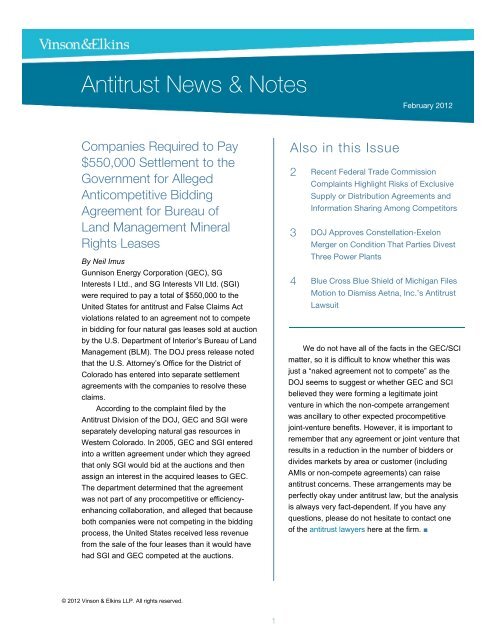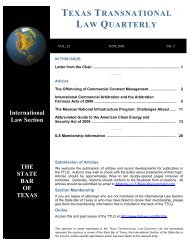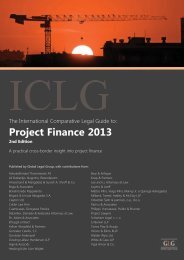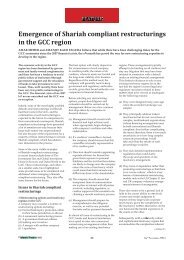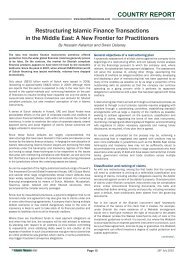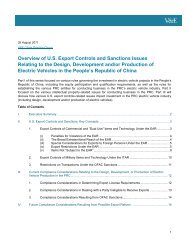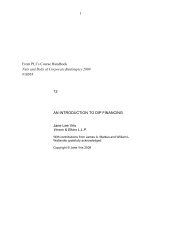Create successful ePaper yourself
Turn your PDF publications into a flip-book with our unique Google optimized e-Paper software.
Antitrust News & Notes<br />
April 2007<br />
<strong>February</strong> 2012<br />
Companies Required to Pay<br />
$550,000 Settlement to the<br />
Government for Alleged<br />
Anticompetitive Bidding<br />
Agreement for Bureau of<br />
Land Management Mineral<br />
Rights Leases<br />
By Neil Imus<br />
Gunnison Energy Corporation (GEC), SG<br />
Interests I Ltd., and SG Interests VII Ltd. (SGI)<br />
were required to pay a total of $550,000 to the<br />
United States for antitrust and False Claims Act<br />
violations related to an agreement not to compete<br />
in bidding for four natural gas leases sold at auction<br />
by the U.S. Department of Interior’s Bureau of Land<br />
Management (BLM). The DOJ press release noted<br />
that the U.S. Attorney’s Office for the District of<br />
Colorado has entered into separate settlement<br />
agreements with the companies to resolve these<br />
claims.<br />
According to the complaint filed by the<br />
Antitrust Division of the DOJ, GEC and SGI were<br />
separately developing natural gas resources in<br />
Western Colorado. In 2005, GEC and SGI entered<br />
into a written agreement under which they agreed<br />
that only SGI would bid at the auctions and then<br />
assign an interest in the acquired leases to GEC.<br />
The department determined that the agreement<br />
was not part of any procompetitive or efficiencyenhancing<br />
collaboration, and alleged that because<br />
both companies were not competing in the bidding<br />
process, the United States received less revenue<br />
from the sale of the four leases than it would have<br />
had SGI and GEC competed at the auctions.<br />
Also in this Issue<br />
2 Recent Federal Trade Commission<br />
Complaints Highlight Risks of Exclusive<br />
Supply or Distribution Agreements and<br />
Information Sharing Among Competitors<br />
3 DOJ Approves Constellation-Exelon<br />
Merger on Condition That Parties Divest<br />
Three Power Plants<br />
4 Blue Cross Blue Shield of Michigan Files<br />
Motion to Dismiss Aetna, Inc.’s Antitrust<br />
Lawsuit<br />
We do not have all of the facts in the GEC/SCI<br />
matter, so it is difficult to know whether this was<br />
just a “naked agreement not to compete” as the<br />
DOJ seems to suggest or whether GEC and SCI<br />
believed they were forming a legitimate joint<br />
venture in which the non-compete arrangement<br />
was ancillary to other expected procompetitive<br />
joint-venture benefits. However, it is important to<br />
remember that any agreement or joint venture that<br />
results in a reduction in the number of bidders or<br />
divides markets by area or customer (including<br />
AMIs or non-compete agreements) can raise<br />
antitrust concerns. These arrangements may be<br />
perfectly okay under antitrust law, but the analysis<br />
is always very fact-dependent. If you have any<br />
questions, please do not hesitate to contact one<br />
of the antitrust lawyers here at the firm. ■<br />
© 2012 <strong>Vinson</strong> & <strong>Elkins</strong> <strong>LLP</strong>. All rights reserved.<br />
1
Antitrust News & Notes<br />
Recent Federal Trade Commission<br />
Complaints Highlight Risks of<br />
Exclusive Supply or Distribution<br />
Agreements And Information<br />
Sharing Among Competitors<br />
By Vincent van Panhuys<br />
Recent Federal Trade Commission (FTC) complaints<br />
against a swimming pool products distributor and,<br />
separately, three ductile iron pipe fittings (DIPF) suppliers<br />
highlight the FTC’s appetite to challenge supply and<br />
distribution practices using its Section 5 authority. The FTC<br />
actions call for caution in contracting for companies with<br />
large market shares.<br />
Moreover, the FTC investigations and complaints<br />
in DIPF highlight the risks of information sharing in<br />
highly concentrated industries, even through third parties<br />
such as trade associations. The consent decree on<br />
information sharing against DIPF suppliers that settled<br />
with the commission is more restrictive than the safe<br />
harbor provision of the 1996 DOJ/FTC Health Care<br />
Guidelines, which antitrust lawyers have traditionally<br />
relied on in counseling clients on information exchanges<br />
and benchmarking with competitors.<br />
In addition to the cost of an FTC investigation and<br />
potential remedies imposed by the agency, companies<br />
for which conduct is challenged by the FTC face the risk<br />
of civil litigation. For example, on the heels of the FTC<br />
complaint, Pool Corporation (PoolCorp), the swimming<br />
pool distributor, was sued by purchasers of pool supplies<br />
seeking treble damages in multiple class-action lawsuits<br />
in multiple jurisdictions including Florida, California, and<br />
Louisiana. The allegations in these suits typically mirror<br />
those made by the FTC in its public administrative<br />
complaint.<br />
Ductile Iron Pipe Fittings<br />
In January, the FTC brought an administrative complaint<br />
against three of the largest U.S. suppliers of ductile iron<br />
pipe fittings, which are used in municipal water systems,<br />
alleging they violated Section 5 of the FTC Act that<br />
prohibits entities from engaging in deceptive or unfair<br />
commercial practices. The FTC alleged that in 2008,<br />
McWane Inc., Sigma Corporation, and Star Pipe<br />
improperly exchanged competitively sensitive information<br />
through a trade association and changed their business<br />
practices to make it easier to collude (for example, by<br />
limiting the discretion of regional sales personnel to offer<br />
price discounts).<br />
The FTC further alleged that in 2009, the “Buy<br />
American” provisions imbedded in the Federal stimulus<br />
program gave McWane an effective monopoly as the<br />
only U.S. producer of DIPF. The FTC alleged that at<br />
this point, McWane and Sigma signed an improper<br />
distribution agreement that kept Sigma from producing<br />
in the U.S. and competing with McWane, and in return<br />
gave Sigma distribution rights on McWane products.<br />
Moreover, the FTC alleged that as part of the distribution<br />
agreement, Sigma agreed to adopt exclusive dealing<br />
provisions similar to those McWane had adopted in order<br />
to keep competitors, including Star, out of the domestic<br />
DIPF market. The complaint alleged that Sigma had no<br />
legitimate business justification for entering into the<br />
distribution agreement with McWane.<br />
McWane is challenging the administrative complaint<br />
and is scheduled for an administrative hearing at the<br />
FTC beginning in September. In a statement on the<br />
company website, McWane’s president vowed to “fight<br />
this unjustified complaint with every resource at our<br />
command” and suggested the FTC investigation was<br />
the result of complaints by foreign competitors. The<br />
adjudication against Star was withdrawn last week for<br />
the purpose of considering a consent agreement (the<br />
details of which are not yet public). And, Sigma signed a<br />
consent agreement in January in which it did not admit<br />
guilt, but agreed to refrain from the types of practices the<br />
FTC alleged. The proposed order requires Sigma to refrain<br />
from fixing prices, dividing markets, or inviting others to do<br />
so. In addition, the order imposes significant restrictions on<br />
Sigma’s ability to share competitively sensitive information.<br />
For 20 years, Sigma may not exchange competitively<br />
sensitive information that is more than six months old,<br />
may only exchange such information in a highly aggregated<br />
form, and may exchange such information no more than<br />
twice per year. If the industry remains highly concentrated,<br />
the proposed order completely prohibits Sigma from sharing<br />
competitively sensitive information related to price, cost, or<br />
unit cost during this 20-year period.<br />
2
V&E LOGO<br />
One of the four FTC commissioners, Commissioner<br />
Rosch, dissented in part with respect to the exclusive<br />
dealing allegations in the DIPF actions which he<br />
believed were not based on unlawful conduct. Moreover,<br />
Commissioner Rosch disagreed with the allegations against<br />
Star, which he stated seemed “much less culpable” than<br />
those of McWane or Sigma.<br />
Swimming Pool Product Distributor<br />
In January, the nation’s largest pool products distributor,<br />
PoolCorp finalized its settlement of Section 5 allegations<br />
with the FTC. In November, the FTC alleged that PoolCorp<br />
had impeded new distributors from entering the distribution<br />
business by signing exclusive agreements with pool product<br />
manufacturers. The FTC had concluded that PoolCorp’s<br />
market share exceeded 80 percent in some areas and<br />
accounted for 30 - 50 percent of most pool supply<br />
manufacturers’ sales, making it by far their largest<br />
customer. The commission concluded that PoolCorp<br />
abused its clout to prevent manufacturers from selling<br />
to distributors trying to enter the market. The settlement<br />
agreement prohibits PoolCorp from (1) conditioning a<br />
manufacturer’s purchase or sale of pool products or<br />
participation in PoolCorp’s preferred vendor program,<br />
on the intended or actual sale to another distributor;<br />
(2) pressuring a manufacturer to limit its sales to another<br />
distributor; or (3) discriminating against a manufacturer for<br />
selling to another distributor. The settlement also requires<br />
PoolCorp to implement an antitrust compliance program.<br />
Commissioner Rosch dissented to the exclusive<br />
dealing allegations against PoolCorp, because the FTC<br />
has “not been able to identify any harm to consumers<br />
or competition as a result of the actions of PoolCorp,”<br />
and recommended that the commission drop its complaint.<br />
Commissioner Rosch emphasized that the FTC had not<br />
alleged any harm to incumbent distributors, only new<br />
ones, but noted that “no entrants were actually excluded.”<br />
He emphasized that entrants and other distributors<br />
maintained access to multiple manufacturers despite<br />
PoolCorp’s exclusive contracts with certain manufacturers<br />
and noted that the barrier to entry for new distributors<br />
was low. ■<br />
DOJ Approves Constellation-Exelon<br />
Merger on Condition That Parties<br />
Divest Three Power Plants<br />
By Sandeep Vaheesan<br />
On December 21, 2011, the Department of Justice<br />
(DOJ) approved the merger between Exelon Corporation<br />
(Exelon) and Constellation Energy Group, Inc.<br />
(Constellation), subject to divestitures of certain assets.<br />
Exelon and Constellation are wholesale electricity<br />
generators that own 25,000 MW and 11,000 MW of<br />
generation capacity, respectively. In 2010, Exelon had<br />
annual revenue of $18.6 billion and Constellation had<br />
annual revenue of $14.3 billion. Both companies own<br />
significant generation capacity in the Pennsylvania,<br />
Jersey, Maryland Power Pool (PJM), which operates the<br />
wholesale power market in the Mid-Atlantic and several<br />
Midwestern states.<br />
Because of inadequate high-voltage transmission<br />
capacity, the PJM market during many hours of the<br />
years, in effect, “breaks up” into smaller markets that<br />
need to rely on local generation to meet demand. Two of<br />
these markets are PJM Mid-Atlantic North and PJM Mid-<br />
Atlantic South, which together cover eastern Pennsylvania,<br />
eastern Maryland, Delaware, Washington, DC, and most of<br />
Virginia. During periods of high demand, there is often not<br />
enough transmission capacity to permit generators outside<br />
these areas to sell power to customers located in them. As<br />
a result, locally situated generators must run to meet<br />
demand. Due to these physical constraints, the DOJ<br />
defined PJM Mid-Atlantic North and PJM Mid-Atlantic South<br />
as the geographic markets of interest in this merger.<br />
Constellation and Exelon both own generation plants<br />
in PJM Mid-Atlantic North and PJM Mid-Atlantic South.<br />
After the merger, they would own 28 percent of the capacity<br />
in PJM Mid-Atlantic North and 22 percent of the capacity<br />
in PJM Mid-Atlantic South. In addition, they would own a<br />
portfolio of low-cost “baseload” plants that run nearly all<br />
the time and high-cost “peaking” plants that operate at<br />
times of higher demand. Due to this combination, the highcost<br />
peaking plants can be used to raise market prices to<br />
increase the profits of the low-cost baseload plants. On this<br />
basis, the DOJ alleged that the merging parties’ mix of<br />
assets would give them the ability and incentive to raise<br />
wholesale electricity prices.<br />
3
Antitrust News & Notes<br />
To remedy the competitive concerns from the merger,<br />
the DOJ required the merging parties to divest three coalfired<br />
power plants located in Baltimore. These facilities<br />
must be sold to a DOJ-approved buyer within 150 days<br />
after the merger is consummated. The DOJ stated that<br />
these divestitures would eliminate the ability and incentive<br />
of the parties to raise wholesale power prices following the<br />
merger and preserve competition in the relevant markets. ■<br />
Blue Cross Blue Shield of Michigan<br />
Files Motion to Dismiss Aetna, Inc.’s<br />
Antitrust Lawsuit<br />
By Kimberley Biagioli and Alicia Burns-Wright<br />
On December 6, 2011, Aetna, Inc. (Aetna) filed a complaint<br />
against Blue Cross Blue Shield of Michigan (Blue Cross),<br />
claiming that its use of most favored nation (MFN) clauses<br />
in contracts with hospitals across the state violates Section<br />
1 of the Sherman Act and Section 2 of the Michigan<br />
Antitrust Reform Act. 1 Aetna alleges that the MFN clauses<br />
raise the cost of health insurance in Michigan by causing<br />
health insurance providers to pay elevated rates for hospital<br />
services. The complaint follows the district court’s decision<br />
to deny Blue Cross’ motion to dismiss a separate complaint<br />
filed in October 2010 by the Antitrust Division of the<br />
Department of Justice (DOJ) and the State of Michigan<br />
involving the same alleged antitrust violations.<br />
According to its complaint, Aetna attempted to expand<br />
its network in Michigan by acquiring a Michigan-based<br />
health insurance provider in 2005. Aetna achieved initial<br />
success, with revenues in Michigan increasing from $12.9<br />
million in 2005 to $110.8 million in 2007. 2 The complaint<br />
alleges that, in an effort to defend its position as the<br />
dominant health insurance provider in Michigan, Blue<br />
Cross “used its incumbent power to impose exclusionary<br />
contracts on hospitals” to thwart Aetna’s growth. 3 As a<br />
result, Aetna contends that its membership declined from<br />
33,900 customers in 2007 to 14,900 in 2010.<br />
Aetna alleges that the MFN clauses violate Section 1<br />
of the Sherman Act by restraining competition in the market<br />
for the sale of insurance and administrative services in<br />
Michigan. By requiring the contracting hospital to charge<br />
Blue Cross’ competitors more or no less than the amount<br />
Blue Cross pays for the same hospital services, the<br />
complaint argues that the clauses were designed to<br />
increase competing health insurance providers’ costs,<br />
sometimes by more than 25 percent. Unlike traditional<br />
MFN clauses, which guarantee low costs for the contracting<br />
party, Aetna claims Blue Cross’ MFN clauses are<br />
anticompetitive by design because Blue Cross agrees<br />
to increase the amount it pays to the contracting hospitals<br />
in order to guarantee even higher costs for competitors.<br />
Aetna asserts that the hospitals have no choice but to<br />
agree to the MFN clauses because Blue Cross serves at<br />
least 60 percent of the commercial health plan population<br />
in Michigan. 4<br />
Blue Cross has filed a motion to dismiss the complaint<br />
claiming that Aetna failed to allege specific anticompetitive<br />
effects in the relevant market caused by the MFN clauses.<br />
Although the complaint contains allegations that the MFNs<br />
hurt Aetna’s membership, Blue Cross’ motion argues that<br />
Aetna failed to show injury to the overall market, not just a<br />
private competitor. Blue Cross alleges that use of the<br />
MFN clauses is strategic, competitive behavior, not<br />
anticompetitive acts. Blue Cross also claims that Aetna<br />
failed to establish a causal relationship between its decline<br />
in membership and the MFN clauses.<br />
If successful, Aetna seeks treble damages and an<br />
injunction to prevent Blue Cross from using MFN clauses<br />
in hospital contracts. The hearing on Blue Cross’ motion to<br />
dismiss is set for April 18, 2012. ■<br />
Antitrust News & Notes is published by the Antitrust<br />
practice group of <strong>Vinson</strong> & <strong>Elkins</strong> <strong>LLP</strong>. This newsletter is<br />
not intended to be legal advice or a legal opinion on any<br />
specific facts or circumstances. The contents are intended<br />
for general information only. Results described herein may<br />
be subject to reconsideration or appeal. Prior results do not<br />
guarantee a similar outcome. Application of the information<br />
reported herein to particular facts or circumstances should<br />
be analyzed by legal counsel.<br />
1<br />
2<br />
3<br />
Complaint, Aetna, Inc. v. Blue Cross Blue Shield of Michigan¸<br />
No. 2:11-cv-15346 (E.D. Mich. Dec. 6, 2011).<br />
Aetna states its revenues for fully insured large accounts<br />
(“Select Accounts”) and “small group” membership separately<br />
in the Complaint. See id. at 14.<br />
Id. at 14.<br />
4<br />
Id. at 21.<br />
4
Antitrust News & Notes<br />
Antitrust Practice Contacts<br />
Name Office Email Phone<br />
Alden L. Atkins Washington aatkins@velaw.com +1.202.639.6613<br />
Frank C. Brame Dallas fbrame@velaw.com +1.214.220.7818<br />
Neil W. Imus Washington nimus@velaw.com +1.202.639.6675<br />
Matthew J. Jacobs Palo Alto mjacobs@velaw.com +1.650.687.8214<br />
Jeffrey S. Johnston Houston jjohnston@velaw.com +1.713.758.2198<br />
William E. Lawler III Washington wlawler@velaw.com +1.202.639.6676<br />
Cathy A. Lewis Washington clewis@velaw.com +1.202.639.6537<br />
Dionne C. Lomax Washington dlomax@velaw.com +1.202.639.6610<br />
Jason M. Powers Houston jpowers@velaw.com +1.713.758.2522<br />
Harry M. Reasoner Houston hreasoner@velaw.com +1.713.758.2358<br />
James A. Reeder, Jr. Houston jreeder@velaw.com +1.713.758.2202<br />
Craig P. Seebald Washington cseebald@velaw.com +1.202.639.6585<br />
Kathleen B. Spangler Houston kspangler@velaw.com +1.713.758.2853<br />
Stuart Tonkinson Dallas stonkinson@velaw.com +1.214.220.7952<br />
William R. Vigdor Washington wvigdor@velaw.com +1.202.639.6737<br />
<strong>Vinson</strong> & <strong>Elkins</strong> <strong>LLP</strong> Attorneys at Law Abu Dhabi Austin Beijing Dallas Dubai Hong Kong<br />
Houston London Moscow New York Palo Alto Riyadh Shanghai Tokyo Washington www.velaw.com<br />
5


